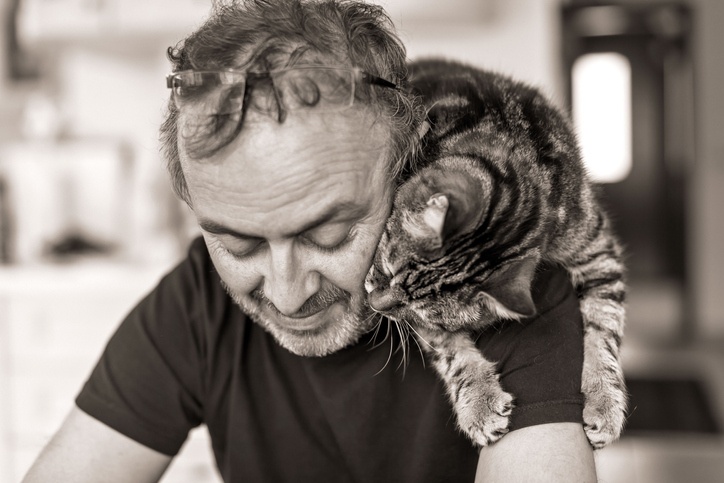What is Feline Hyperthyroidism?

Hyperthyroidism is a muscle wasting disease caused by increased thyroid hormones, resulting from one or more benign tumors (adenomas) of the thyroid gland. With time, the adenomas may evolve into more aggressive, and rarely, malignant tissue (adenocarcinoma).
High thyroid hormones cause an increased metabolism, leading to weight loss. Cats (carnivores) burn protein more readily than fat for energy, which is seen as muscle wasting over the spine, hips and back legs, sometimes despite a chubby tummy. Some cats have more difficulty jumping up onto furniture due to muscle weakness. Most cats try to compensate by eating more (polyphagia). Some cats are so ravenous, they steal food off the kitchen counters or the owners’ plates! Other cats may become pickier, even though they may act hungrier. While the weight loss may happen quickly, it may also be so gradual that some owners may not even realize it has occurred. Many hyperthyroid cats have increased urination, and need to drink more water to catch up to their fluid losses. Hyperthyroidism usually leads to behavior changes, which may include agitation, anxiety, and even aggression toward animals (including human companions). Owners frequently describe their cats “jetting up and down the halls” or as “more playful” or “clingy.” The agitation makes some cats “talk more.” They become more vocal, and may restlessly ‘haunt the house’ caterwauling. Some hyperventilate (pant), especially if stressed, e.g., in the car or veterinary office. Most have high heart rates, even when in a relaxed environment. Vomiting and diarrhea may be caused (or at least worsened) by thyroid disease, even if caused by a different (non-thyroidal) problem, such as inflammatory bowel disease. Some cats groom excessively when they’re anxious from hormonal duress, licking or snatching tufts of fur out, leaving bald or ‘moth-eaten’ areas. Some groom less, allowing flakes and oil to build up in their coats, making them look ‘scruffy.’
Over time, untreated or poorly controlled hyperthyroidism leads to deleterious effects on many of the cat's internal organs. Heart failure, kidney and liver disease, muscle wasting, chronic emaciation, and/or severe metabolic dysfunction can develop, ultimately leading to death.
Testimonials
They are very personable, professional, and knowledgeable about their very specialized practice. If you have a cat with thyroid issues, I highly recommend this clinic. read more
BeckySeattle, WA
As a member of an animal rescue organization on Vashon Island (VIPP), as well as being a chronic cat owner, I've had many opportunities to visit the Feline Hyperthyroid Treatment Center. Over the past... read more
Piro Kramar. Vashon Island Pet ProtectorsVashon Island, WA
My cat was diagnosed as hyperthyroid when she was 10. We had her treated as soon as she was diagnosed and I was glad it was found early. I didn’t really give the thyroid... read more
SavannahLynnwood, WA
Pox's Story Does it make sense to treat hyperthyroid in a fourteen-year-old, mostly outdoor cat? That’s what we were asking ourselves in the summer of 2013. Pox let me know his opinion by following me... read more
PoxSeattle, WA
Monty is 12 years old. Dr. Vaughan had been monitoring Monty’s thyroid over the years and identified that he was borderline for hyperthyroidism. After discussing his overall appearance, behavior and appetite, we decided that... read more
MontyThree months ago my 13 year old kitty Miss Fanny spent three days in the care of Dr. Vaughan and the staff. Before treatment she had been losing weight, getting more lethargic and her... read more
Miss FannyNorthbend, WA
We want to thank you for your extraordinary efforts in looking after our Samson's well being. You took the initiative of a problem we were not aware was even present. We are very, very... read more
SamsonPort Townsend, WA
Thanks to Dr Faythe Vaughan, and her kind staff in Shoreline and Tacoma for giving us at least 5 extra, good quality, years with our buddy, Rocky! He was a rescue cat to begin with, and his good... read more
RockyTacoma, WA
My family has had Lila since she was a kitten. She is turning 15 in October, I was only 10 when we got her. I moved away as an adult for a few years... read more
LilaShoreline, WA
Dr. Vaughan; Kathy; Miranda; and anyone who was involved in treating and caring for Tigger. Just wanted you to see the life Tigger is leading because of your excellent care on this upcoming anniversary... read more
PepperWill & Grace found me in 1999 when they were four weeks old. They were born near in a parking lot off Highway 99. They are twins and do everything together. This year they celebrated their... read more
Will, Grace, and HunterEdmonds, WA
Ripley (kitty) and I just wanted to thank Dr Vaughan and the whole staff for your great service and care. You were all great to work with, and communicated well with us! Ripley left... read more
Kali & RipleyYou took care of our Nina Kitty and it was like she found the Fountain of Youth! At age twelve, she had been slowly losing weight and getting a bit more "yowly" but we... read more
NinaPrincess started losing weight and after checking with the vet she was confirmed as being Hyperthyroid. After Approximately 13 months of of a paste-like med applied to the ears, switching from left to right... read more
Great place. They were so good to my kitty who was really scared. He seems to be completely cured. read more
I wanted to drop you and everyone at FHTC a note to let you know that Byron (the PAWS™ kitty FHTC treated pro bono earlier this year) was adopted last month! Even better, he... read more
ByronSeattle, WA
Hello! Just wanted to let you know Rio Blanco is doing great! As soon as we got home he started emptying the bowls of food! I haven't even opened the anti-nausea or the... read more
Patrick and Rio



